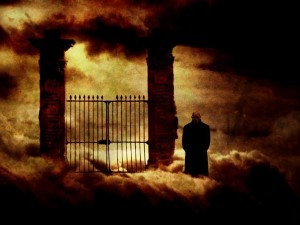 In an e-mail teaching letter sent out from the desiring-god website, Dr. John Piper writes:
In an e-mail teaching letter sent out from the desiring-god website, Dr. John Piper writes:
C.S. Lewis is one of the top 5 dead people who have shaped the way I see and respond to the world. But he is not a reliable guide on a number of important theological matters. Hell is one of them. His stress is relentlessly that people are not “sent” to hell but become their own hell. His emphasis is that we should think of “a bad man’s perdition not as a sentence imposed on him but as the mere fact of being what he is.” (For all the relevant quotes, see Martindale and Root, The Quotable Lewis, 288-295.)
This inclines him to say, “All that are in hell choose it.” And this leads some who follow Lewis in this emphasis to say things like, “All God does in the end with people is give them what they most want.”
I come from the words of Jesus to this way of talking and find myself in a different world of discourse and sentiment. I think it is misleading to say that hell is giving people what they most want. I’m not saying you can’t find a meaning for that statement that’s true, perhaps in Romans 1:24-28. I’m saying that it’s not a meaning that most people would give to it in light of what hell really is. I’m saying that the way Lewis deals with hell and the way Jesus deals with it are very different. And we would do well to follow Jesus.
The misery of hell will be so great that no one will want to be there. They will be weeping and gnashing their teeth (Matthew 8:12). Between their sobs, they will not speak the words, “I want this.” They will not be able to say amid the flames of the lake of fire (Revelation 20:14), “I want this.” “The smoke of their torment goes up forever and ever, and they have no rest, day or night” (Revelation 14:11). No one wants this.
When there are only two choices, and you choose against one, it does not mean that you want the other, if you are ignorant of the outcome of both. Unbelieving people know neither God nor hell. This ignorance is not innocent. Apart from regenerating grace, all people “suppress the truth in unrighteousness” (Rom 1:18).
The person who rejects God does not know the real horrors of hell. This may be because he does not believe hell exists, or it may be because he convinces himself that it would be tolerably preferable to heaven.
But whatever he believes or does not believe, when he chooses against God, he is wrong about God and about hell. He is not, at that point, preferring the real hell over the real God. He is blind to both. He does not perceive the true glories of God, and he does not perceive the true horrors of hell.
So when a person chooses against God and, therefore, de facto chooses hell—or when he jokes about preferring hell with his friends over heaven with boring religious people—he does not know what he is doing. What he rejects is not the real heaven (nobody will be boring in heaven), and what he “wants” is not the real hell, but the tolerable hell of his imagination.
When he dies, he will be shocked beyond words. The miseries are so great he would do anything in his power to escape. That it is not in his power to repent does not mean he wants to be there. Esau wept bitterly that he could not repent (Hebrew 12:17). The hell he was entering into he found to be totally miserable, and he wanted out. The meaning of hell is the scream: “I hate this, and I want out.”
What sinners want is not hell but sin. That hell is the inevitable consequence of unforgiven sin does not make the consequence desirable. It is not what people want—certainly not what they “most want.” Wanting sin is no more equal to wanting hell than wanting chocolate is equal to wanting obesity. Or wanting cigarettes is equal to wanting cancer.
Beneath this misleading emphasis on hell being what people “most want” is the notion that God does not “send” people to hell. But this is simply unbiblical. God certainly does send people to hell. He does pass sentence, and he executes it. Indeed, worse than that. God does not just “send,” he “throws.”
“If anyone’s name was not found written in the book of life, he was thrown (Greek eblethe) into the lake of fire” (Revelation 20:15; cf. Mark 9:47; Matthew 13:42; 25:30).
The reason the Bible speaks of people being “thrown” into hell is that no one will willingly go there, once they see what it really is. No one standing on the shore of the lake of fire jumps in. They do not choose it, and they will not want it. They have chosen sin. They have wanted sin. They do not want the punishment. When they come to the shore of this fiery lake, they must be thrown in.
When someone says that no one is in hell who doesn’t want to be there, they give the false impression that hell is within the limits of what humans can tolerate. It inevitably gives the impression that hell is less horrible than Jesus says it is.
We should ask: How did Jesus expect his audience to think and feel about the way he spoke of hell? The words he chose were not chosen to soften the horror by being accommodating to cultural sensibilities. He spoke of a “fiery furnace” (Matthew 13:42), and “weeping and gnashing teeth” (Luke 13:28), and “outer darkness” (Matthew 25:30), and “their worm [that] does not die” (Mark 9:48), and “eternal punishment” (Matthew 25:46), and “unquenchable fire” (Mark 9:43), and being “cut in pieces” (Matthew 24:51).
These words are chosen to portray hell as an eternal, conscious experience that no one would or could ever “want” if they knew what they were choosing. Therefore, if someone is going to emphasize that people freely “choose” hell, or that no one is there who doesn’t “want” to be there, surely he should make every effort to clarify that, when they get there, they will not want this.
Surely the pattern of Jesus—who used blazing words to blast the hell-bent blindness out of everyone— should be followed. Surely, we will grope for words that show no one, no one, no one will want to be in hell when they experience what it really is. Surely everyone who desires to save people from hell will not mainly stress that it is “wantable” or “chooseable,” but that it is horrible beyond description — weeping, gnashing teeth, darkness, worm-eaten, fiery, furnace-like, dismembering, eternal, punishment, “an abhorrence to all flesh” (Isaiah 66:24).
I thank God, as a hell-deserving sinner, for Jesus Christ my Savior, who became a curse for me and suffered hellish pain that he might deliver me from the wrath to come. While there is time, he will do that for anyone who turns from sin and treasures him and his work above all.
Trembling before such realities, and trusting Jesus,
Pastor John Piper

 They called it “the shot heard around the world.” It kicked off an 8-year war of independence for the United States of America. But an event took place prior to that in the city of Boston: The Boston Massacre. This event touched Ethan Allen in Vermont, Patrick Henry, George Washington, Sam Adams, and John Adams. In the Boston Massacre, British troops fired upon unarmed civilians.
They called it “the shot heard around the world.” It kicked off an 8-year war of independence for the United States of America. But an event took place prior to that in the city of Boston: The Boston Massacre. This event touched Ethan Allen in Vermont, Patrick Henry, George Washington, Sam Adams, and John Adams. In the Boston Massacre, British troops fired upon unarmed civilians. John Piper:
John Piper: